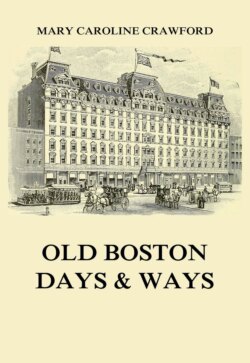Old Boston Days & Ways

Реклама. ООО «ЛитРес», ИНН: 7719571260.
Оглавление
Mary Caroline Crawford. Old Boston Days & Ways
CONTENTS:
FOREWORD
CHAPTER I. THE MASTER OF THE PUPPETS
CHAPTER II. THE CHALLENGE TO THE CROWN
CHAPTER III. TWO ENGLISH CHAMPIONS OF THE DAWNING REPUBLIC
CHAPTER IV. WHEN EARL PERCY LIVED OPPOSITE THE COMMON
CHAPTER V. THE SPRIGHTLY CHRONICLES OF JOHN ANDREWS
CHAPTER VI. THE MESSENGER OF THE REVOLUTION
CHAPTER VII. WHEN FANEUIL HALL WAS A PLAYHOUSE
CHAPTER VIII. A PAINTER OF FAIR WOMEN
CHAPTER IX. JOHN HANCOCK AND HIS DOROTHY
CHAPTER X. THE MAN OF THE TOWN MEETING
CHAPTER XI. IN THE REIGN OF A REPUBLICAN "KING"
CHAPTER XII. AN EIGHTEENTH CENTURY AERONAUT
CHAPTER XIII. THE BEGINNINGS OF LITERATURE AND MUSIC
CHAPTER XIV. SOME FAMOUS FRENCH VISITORS TO THE TOWN
CHAPTER XV. TWO HEROES OF PEACE
CHAPTER XVI. SOCIAL LIFE IN THE TRANSITION PERIOD
CHAPTER XVII. EARLY BOSTON THEATRES AND THEIR STARS
Отрывок из книги
Old Boston Days & Ways
From The Dawn Of The Revolution Until The Town Became A City
.....
Percy, not having a wife to whom he could send accounts of his American campaign, addressed his letters to his friends and kinsfolk overseas. And they, as good fortune would have it, preserved his communications carefully. At first the letters are disposed to undervalue the character and courage of the Americans but, little by little, there creeps in an appreciation of the resourcefulness of a people who could cope with a royal army, and parry blows inflicted by royal edicts. Under the heading "Camp at Boston, Aug. 21, 1774," he says: "Their method of eluding that part of the Act [which swept away the rights of Massachusetts under the charter] relating to the town meetings is strongly characteristic of the people.
They say that since the town meetings are forbid by the Act, they shall not hold them, but as they do not see any mention made of county meetings, they shall hold them for the future. They therefore go a mile out of town, do just the same business there they formerly did in Boston, call it a county meeting, & so elude the Act. In short, I am certain that it will require a great length of time, much steadiness, and many troops, to reestablish good order & government. . . ."
.....